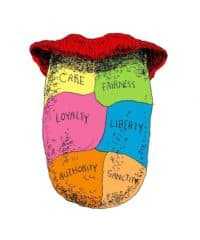Culturen verschillen. En toch bestaan er gelijkenissen. Bijvoorbeeld gelijkaardige moraal of wetgeving. Tijdens een interview voor Farnam Street sprak Shane Parrish met Jonathan Haidt, auteur en sociaal psycholoog. Haidt bespreekt de zes gedeelde “moral foundations” over culturen heen.
What is morality? Morality is a thing that people do. People in the world do similar things: cooking, cuisine, music, language. And people will make judgements about each other. People talk about or judge others. Humans create normative worlds. Norms emerge quickly. For example. How do we address each other? What is appropriate? Can I take that thing you were using? When humans interact, they almost immediately develop behavioural norms. And then they judge each other based on those norms. That’s morality.
How can it be that morality is very different around the world? There are feudal societies, egalitarian societies, cannibalistic societies, trading societies. How can that be? The elements of morality are often similar. As in a psychologist, I thought that was cool. I used to read Carl Jung and he talked about archetypes. And he got rather mystical about it.
I took an evolutionary view. As our tongues contain receptor cells for five different properties of the world. We can taste: sweet, sour, salty, bitter, and umami. Because our ancestors ate fruit and meat, we evolved to have tongues responsive to this.
In the same way, what are the tastebuds of the moral sense? We scanned anthropological and evolutionary literature looking for matches. We hypothesised that the best candidates as taste-buds of the moral sense form our moral foundation.
- Care and compassion, because we’re mammals and we nurture our young.
- We love: attachment, protection, and empathy
- We hate: injury, suffering, and pain
- Fairness and reciprocity, versus cheating. We’re all sensitive to that.
- We love: justice, reciprocity, and altruism
- We hate: unfairness, inequality, and dishonesty
- Loyalty. Group loyalty versus betrayal.
- We love: patriotism, self-sacrifice, and allegiance
- We hate: treachery, duplicity, and selfishness
- Authority versus subversion. We’re hierarchical creatures like most primates.
- We love: respect, tradition, and customs
- We hate: usurpation, insubordination, and defiance
- Sanctity or purity, versus degradation. Here we’re different from other primates because we have a sense of disgust.
- We love: purity, righteousness, and holiness
- We hate: contamination, immorality, and sin
- Liberty or autonomy. For example, if you restrain a kid’s arm or an animal’s arm they will want to escape. The Hebrew Bible tells the story of the Jewish escape from bondage in Egypt.
- We love: freedom, choice, and autonomy
- We hate: bullies, oppression, and slavery
We assume that every human in the world has these taste bust. But your culture may or may not build on them.
Bron: Jonathan Haidt: When Good Intentions Go Bad, aflevering 61 van The Knowledge Project with Shane Parrish, 2 juli 2019, vanaf 1:05:00 achteraan de podcast.

